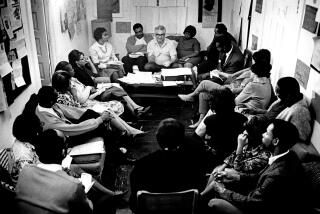They write, but can they read?
- Share via
Over the next month, a series of public readings will take place at the University of Iowa, for authors including such prizewinners as Richard Bausch and Ben Marcus.
But these will be no ordinary readings. They’re auditions, part of an extensive process for filling one of the most influential positions in the academic and literary world: director of the school’s famed Writers’ Workshop.
“In the world of writing and writing programs, to be asked to apply for this directorship is like being asked to do ‘The Tonight Show’ in the entertainment business,” said Bausch, whose many books include “Hello to the Cannibals” and “Last Good Time.”
Known for turning out such acclaimed writers as Flannery O’Connor and Raymond Carver, the workshop seeks a replacement for longtime head Frank Conroy, who said last summer that he was stepping down because the program needed “new blood.” By school policy, he is not involved with selecting his successor, which a committee headed by Iowa executive associate dean Raul Curto expects to announce in the spring.
“We’re looking for someone to continue Frank Conroy’s record of success, a superb writer with energy and enthusiasm and passion for the workshop,” said Linda Maxson, dean of the school’s College of Liberal Arts and Sciences.
“We also want someone who has a vision for where the program might go in the next decade and how that person would take it there.”
Founded in 1936, the Iowa workshop has only had four directors. The four candidates for Conroy’s position all teach creative writing, and they include two Iowa workshop alumni: Bausch, 59, winner last year of the PEN/Malamud prize for short fiction and a professor at George Mason University, and Lan Samantha Chang, 40, author of two books and an instructor at Harvard University.
Finalist Jim Shepard, 48, has published six novels and two story collections and teaches at Williams College. The other nominee, Ben Marcus, 37, is a two-time winner of the Pushcart Prize for short fiction and an assistant professor at Columbia University.
Besides the public readings, the selection process will include interviews and teaching a sample workshop.
Conroy was known as a blunt, sometimes harsh instructor who could reduce students to tears. Bausch acknowledged a few tears in his own classrooms, but says he’s mellowed, at least a little.
“I’ve reached a different idea about what I should be doing. I’m tough, but I also make it clear that failing is part of the process,” Bausch said.
“I think both approaches are equally effective. Frank’s assumption is that real writers won’t be turned back by anything. If you don’t have the toughness, you probably shouldn’t be doing it.”
Conroy was also known for preferring straightforward narrative to experimental fiction, but some of his would-be successors have followed other paths.
Shepard’s fiction has taken readers inside the minds of Atty. Gen. John Ashcroft and the Who’s John Entwistle. Marcus’ first book, “The Age of Wire and String,” is a series of nonlinear pieces. His novel, “Notable American Women,” features a boy named Ben Marcus who watches his mother join a feminist cult committed to “emotion removal.”
“I think that every writer has to pick his or her own direction, and I would be a failure as a teacher if I advocated picking my own direction,” Marcus said.
“Iowa is the oldest and most prestigious writing program and they certainly must be doing something right. So it wouldn’t be for me to jump in and make changes without learning everything I can learn and thinking things through.”
More to Read
Sign up for our Book Club newsletter
Get the latest news, events and more from the Los Angeles Times Book Club, and help us get L.A. reading and talking.
You may occasionally receive promotional content from the Los Angeles Times.







